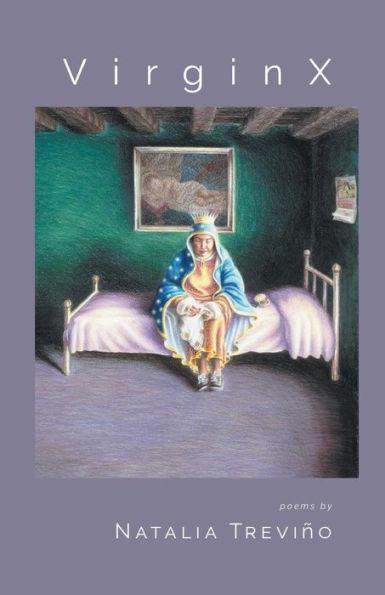
POETRY
Natalia Treviño
VirginX
Finishing Line Press
Paperback (also available in hardcover), 978-1-6353-4651-0, 44 pgs., $14.99
September 7, 2018
Weaving together in-depth research and her own personal experiences in English and Spanish, Natalia Treviño’s chapbook, VirginX (Finishing Line Press, 2018), is an exploration of La Virgen, her history, her numerous names, and the ways she is present to the author and so many others on either side of the border and all over the world.
Like the stars on the ocean-blue robes frequently referenced by Treviño, each poem shines brightly on its own with vivid imagery that takes you right into the heart of a moment in time. Whether it’s the juxtaposition of a horrific plane crash intended to hurt “children having lunch and supplicants in prayer,” or when she seamlessly bridges the image of the constellations in Maria’s robe with the tender act of her mother feeding her “beams of human light,” Treviño’s words invite you to contemplate the pictures she has so brilliantly painted within every poem. And yet, the poems also speak to each other within the collection in a way that threatens to “rush us, our tumbling bodies powerless” in the commanding waves of Treviño’s combination of research, reverence, and revelations.
In a poem imagining Mary’s mother tending to her baby, Treviño offers a warm and moving depiction of a woman who is barely mentioned in Biblical history: She warms water with her hands before using it to remove “the grit collected/between [Mary’s] fingers…before it touched [her] because cold made [her]/cry,” a simple yet relatable act of love that will touch the hearts of many mothers who keep their children’s comfort in mind. Even more powerful are the lines that follow, which tell of the overwhelming and all-consuming flood of feeling that Mary’s mother experiences when she realizes “[her daughter’s] weight/[is] outside of her body,” a gripping reminder of how entwined mother and baby are in the beginning.
Treviño is also a master of interlacing separate thoughts through a single theme into a gorgeous narrative tapestry. In one of her long poems, she exquisitely ties together multiple threads: Maria is the mother of all regardless of man-made borders, the miracles found on the migrant journey, how her border crossings differ from those of the undocumented, and how the fact that she had papers didn’t matter to school bullies who called her a name that made her want to “dry [her] back after [her] shower … because somehow [her] back/stayed wet all day long.” This incredible skill allows the poems, mostly in couplet form, to dance and breathe and move forward with every page.
Just like Treviño has crafted this collection with care by clearly doing the research and digging into her mental mines for memories, Mexican migrants seek the same kind of care and vigilance from La Virgen in order to survive as they make their arduous journey north across the border. In addition to the clothes on their back, food, and water, they keep Maria close in the form of a prayer card or statue, because after all, she travels “as miracles do, without papers.” She is a symbol of hope and love that knows no borders and is called by a multitude of names, a precious few listed in one of the sections of the long poem, “Coatlicue, Queen of Heaven and Earth.” During this eloquent tribute, Treviño also draws a beautiful comparison between Mary’s infinite identities and dandelion seeds that “contain the whole and the fraction of [her],” that drift anywhere and everywhere, so many names for the same soul, la misma Maria.
Whether you are a person of faith or not, Treviño’s work will invite you into a space of peace to contemplate its many meanings waiting to be discovered.
Born in Mexico, and raised in Texas, Natalia Treviño is a professor at Northwest Vista College in San Antonio.
Treviño's fiction appears in Mirrors Beneath the Earth (Curbstone Press), The Platte Valley Review, and her nonfiction appears in Wising Up Anthologies, Complex Allegiances, and Shifting Balance Sheets: Women’s Stories of Naturalized Citizens.
Treviño's poems appear in several publications including Bordersenses, Borderlands Texas Poetry Review, The Houston Literary Review, Sugar House Review, Sliver of Stone, burntdistric, Voices de la Luna, and Inheritance of Light.
Treviño has won several awards for her poetry and fiction including the 2004 Alfredo Cisneros del Moral Award, the 2008 Dorothy Sargent Rosenberg Poetry Prize, and the 2012 Literary Award from the Artist Foundation of San Antonio. Her first book of poetry is Lavando La Dirty Laundry (Mongrel Empire Press 2014).
